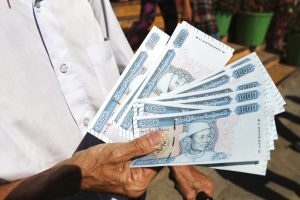A deputy governor of the Central Bank of Myanmar (CBM) was shot at her home in Yangon yesterday, according to media reports, shortly after the bank introduced new foreign currency rules that have drawn protests from foreign embassies and businesses.
According to the Associated Press, which cited a local official, Than Than Swe was shot by two men when she opened the door to her apartment in Yangon’s upmarket Bahan Township. Than Than Swe, who was appointed to her post after the military seized power in February 2021, was then taken to a military hospital where she was confirmed dead.
However, junta spokesperson Maj. Gen. Zaw Min Tun confirmed the shooting to Radio Free Asia’s Myanmar Service, but said that Than Than Swe was recuperating at the hospital. “Her condition is good at this moment,” he told the U.S.-funded broadcaster.
The attack on Than Than Swe, 55, came less than a week after the CBM introduced strict (and desperate) new regulations requiring that all foreign money held in local bank accounts must be exchanged for the local kyat currency. In a notification published in state media earlier this week, the CBM also said that absent a special exemption, transfers of foreign currency abroad can only be carried out via licensed Foreign Exchange Trading banks.
RFA reported that responsibility for the attack was claimed by a group calling itself the Yangon Region Military Command (YRMC), which said in a statement that it had “successfully carried out” the attack on Than Than Swe as it’s “latest target.” The YRMC is one of scores of anti-junta civilian militias that are aligned with the opposition National Unity Government (NUG), which was formed last April from members of the ousted National League for Democracy government and their allies.
The Yangon outfit claimed to have carried out 1,128 attacks from last September, when the NUG announced a popular uprising against the military. The outfit claimed that its attacks resulted in 253 deaths and 300 injuries.
It is unclear whether the attack was related to the new CBM regulations, but Than Than Swe is believed to be among the highest ranking regime figures to have been targeted by resistance forces since the coup. The attempted or successful assassination thus reflects the febrile security situation in Myanmar.
The military junta faces an omnidirectional struggle with dozens of civilian militia, which are often termed People’s Defense Forces (PDFs), and the ethnic armed groups that have been battling the central state for decades, bringing conflict into regions of the central dry plain that have not seen conflict since independence in 1948.
While most of Myanmar’s senior military leadership and junta leadership are ensconced in the capital Naypyidaw, a city specifically designed to forestall such attacks via its sheer size and sprawl, junta officials in other parts of Myanmar have becoming sitting targets for anti-regime forces. Across the country, PDFs have carried out sabotage and launched arson and bomb attacks on junta facilities, as well as targeted killings of soldiers, military officers, civil servants, and dalan, or military collaborators, to which the military has responded with often savage violence.
Also in the crosshairs of the PDFs, the International Crisis Group noted in a briefing this week, are members of pro-regime militias known as Pyusawhti, which the military junta has established in order to stem the gains of the resistance in central Myanmar.
Fifteen months on from the coup, with this violent cycle showing few signs of coming to an end, one can expect such attacks on regime officials to continue.













